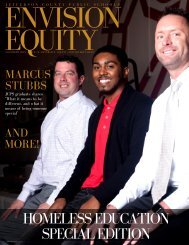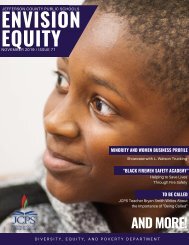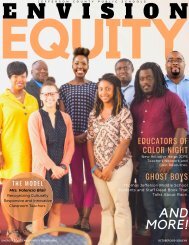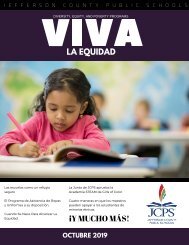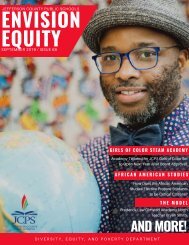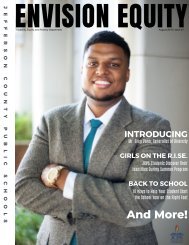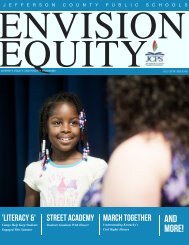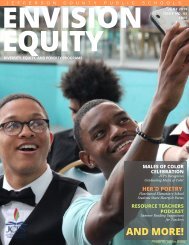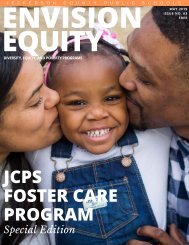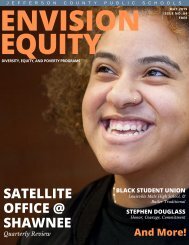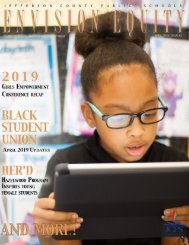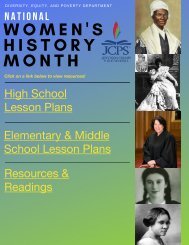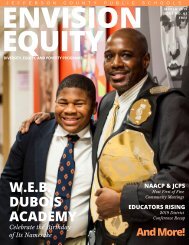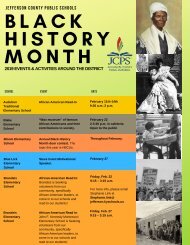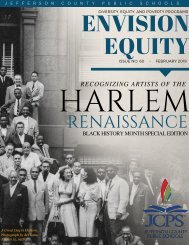Envision Equity Special Edition January 2017
We hope you enjoy this special edition of our Envision Equity newsletter highlighting the work of the Community and Faith Based Organizations in our city. Remember that Envision Equity is also your newsletter. We hope that you will submit articles that celebrate and demonstrate diversity and inclusion. As a reader, you will have access to photos from events that embody the purpose of this newsletter. Please feel free to peruse our Flickr account, which is posted under the cover page. We hope you enjoy, share, and contribute to the newsletter. Lastly, remember to envision equity.
We hope you enjoy this special edition of our Envision Equity newsletter highlighting the work of the Community and Faith Based Organizations in our city. Remember that Envision Equity is also your newsletter. We hope that you will submit articles that celebrate and demonstrate diversity and inclusion. As a reader, you will have access to photos from events that embody the purpose of this newsletter. Please feel free to peruse our Flickr account, which is posted under the cover page.
We hope you enjoy, share, and contribute to the newsletter. Lastly, remember to envision equity.
You also want an ePaper? Increase the reach of your titles
YUMPU automatically turns print PDFs into web optimized ePapers that Google loves.
1<br />
Photo, Getty Images
Photo, Google Images<br />
Photos, Abdul Sharif<br />
100 black<br />
men of<br />
Louisville<br />
Mentoring Students—Changing Lives<br />
By Reggie Gresham—100 Black Men of Louisville<br />
The 100 Black Men of Louisville<br />
organization is focused and invested in<br />
the community of our youth by leading<br />
and engaging them in how their<br />
choices will guide them through life.<br />
The goal is to provide informative guidance and<br />
support in the areas of education, economic<br />
empowerment, health and wellness and<br />
mentorship to our youth community.<br />
MENTORING is the cornerstone of 100 Black Men<br />
of Louisville. The social, cultural, emotional, and<br />
unique needs of youth, primarily African<br />
American males, are addressed through one-toone<br />
and group mentoring relationships by 100<br />
Black Men chapter members. Committed to our<br />
cause, our members serve as positive role<br />
models, advocates, and trusted advisors to<br />
children and young adults, including the<br />
2<br />
Continue on next page
Collegiate 100® and the<br />
Emerging 100®, in the<br />
communities. The 100’s<br />
signature mentoring program<br />
is an effective, evidencedbased<br />
and strategic<br />
intervention that helps youth<br />
reach their full potential and<br />
become contributing<br />
members of society.<br />
Mentoring the 100 Way Across<br />
a Lifetime®, sustained mentor<br />
relationships of at least a<br />
school year and often over multiple years, can<br />
happen at all stages of a mentee’s life,<br />
including college and beyond. The unique,<br />
innovative mentoring initiatives of our<br />
Chapters are locally relevant and vary by<br />
affiliate. Our volunteer members are<br />
comprised of servant leaders and<br />
professionals from diverse sectors and<br />
backgrounds who truly believe in our motto,<br />
“What They See Is What They’ll Be®.” As the<br />
lives of our mentees are transformed through<br />
our mentoring model, so are the lives of<br />
mentors who serve them.<br />
Our innovative Online Mentor Training and<br />
interactive Virtual Mentee Curriculum are<br />
proprietary web-based tools available only to<br />
100 Black Men Chapter members, mentees<br />
and our authorized network of volunteers,<br />
Collegiate 100® and Emerging 100® members.<br />
Upon satisfactory completion of the fivemodule<br />
Online Mentor Training program,<br />
Certificates of Completion are issued by<br />
Headquarters. The five-module Mentee<br />
Curriculum has student pre- and post-tests,<br />
Above, Mr. Dan Weathers and scholarship recipient.<br />
S.M.A.R.T. goals exercises, as well as Mentor<br />
Guides for each module to assist facilitators<br />
with the lessons and corresponding activities.<br />
Our mentoring program helps us partner with<br />
colleges and university throughout the state.<br />
Our partnerships are important in making an<br />
impact in the community and enriching the<br />
lives of our mentees. In 2015 we were<br />
responsible for $420,000 in scholarships to<br />
deserving youth in the community to pursue<br />
their college and university dreams<br />
As President of the 100 Black Men of<br />
Louisville chapter, I am not only committed to<br />
the organizations’ mission but also to our<br />
community by being a part of the necessary<br />
change for our youth to have a brighter future<br />
through their dedication and hard work.<br />
3
Phenomenal Women<br />
Program seeks to mold young ladies into phenomenal women<br />
By Madalyn A. Marables—Atherton High School<br />
L<br />
egacy is defined by an inheritance we leave behind! The legacy that Madalyn Marables; the<br />
Youth Services Center (YSC) Coordinator at Atherton High School, strives to leave behind is a<br />
legacy of love. Madalyn believes if love leads the way, then all the programs and services she<br />
provides will benefit the individual student and the school community. Several programs are<br />
provided that are inclusive of the entire student body, but remain understanding and steadfast in<br />
support of welcoming students with socioeconomic<br />
hardships, educational deficits,<br />
and societal based prejudices. The Youth<br />
Services Center provides numerous<br />
programs throughout the school year and<br />
maintains six continuous and ongoing<br />
biweekly or monthly programs. The two<br />
programs that stand out for their ability to<br />
address the individual excellence of<br />
students’ and develop their personal and<br />
professional college and career goals are<br />
Phenomenal Women and the Men of<br />
Quality program.<br />
The Phenomenal Women program began<br />
Photo, Madalyn Marables.<br />
with a collaboration composed of Bates<br />
Memorial Baptist church, Atherton High School, and the founding student Cheryl Williamson. Cheryl<br />
had a vision to include young ladies primarily from the Sheppard Square Housing Projects in a school<br />
and community program that would connect them to mentors in the community. The program began<br />
as a means to support the students both in the school and in the community with individual growth<br />
and mentor support. Although the collaboration with Bates has ended, the program remains strong in<br />
honor of the legacy Cheryl Williamson left behind (deceased, 11/25/12).<br />
Under the direction of Madalyn Marables, the program has grown from 20 young ladies to 36<br />
phenomenal participants, reflecting a diverse range of the student body and school community. The<br />
students are required to do one of several group service activities and present a formal project to<br />
fellow members and parents at the end of the school year. All students are instructed on professional<br />
dress attire and presentation expectations of either a poster or power point with a prepared speech.<br />
The students meet biweekly as a group and at each session a community mentor provides insight into<br />
4<br />
Continue on next page
the yearly theme topic as it relates to their personal, college, or career journey. Students are<br />
expected to maintain good attendance and strive for personal excellence with their grades and<br />
behavior. The program has a yearly theme that guides the direction of the students and mentors.<br />
For Example, last year the theme was Entrepreneurship and all mentors were Entrepreneurs and<br />
business affiliated persons. This year the theme is Excellence in Leadership through Service,<br />
Gratitude, Humility, Respect, and Appreciation. The need to give back and think about the impact<br />
that individual students can make are emphasized throughout the school year by mentors and the<br />
YSC. All field trips are designed for personal growth and development. The students attend<br />
leadership conferences, college trips, community plays, and a yearly enrichment retreat.<br />
The young ladies have given great feedback, stating that the program has benefited their ability to<br />
focus on their future, experience activities that otherwise may not have been possible, and<br />
encouraged them to be successful both inside and outside the classroom.<br />
The Men of Quality are Atherton’s men of distinction! The young men have similar opportunities,<br />
expectations, and experiences as the young ladies group. They are required to complete service,<br />
presentations, and biweekly meetings. This program is district wide and designed by the Omega<br />
Psi Phi fraternity working in collaboration with both the fraternity and community male mentors.<br />
The program at Atherton is facilitated by Madalyn Marables, but mentors are reflective of the<br />
diversity needed to mentor young men of color. All speakers have been from a variety of<br />
backgrounds and professions such as Troy Marables, Trust Officer and Client Services Manager;<br />
Delquan Dorsey, JCPS Community Engagement Coordinator and Fraternity member; Vincel<br />
Anthony, National Business Development Manager and Fraternity member; Kenneth Ray, Chief<br />
Executive Officer; Lance West, Minister and Administrative Associate U of L Alumni Association;<br />
Gerald Sydnor, Staff Sergeant U.S. Army, and many other yearly and ongoing supporters and<br />
speakers for the young men. The program would not be possible without the mentors that give of<br />
their time freely to help develop the students personally, academically, and their social and<br />
emotional well-being. The young men attend a yearly conference for the Men of Quality program,<br />
college field trips, and a teambuilding retreat.<br />
Madalyn believes that these young people are the future leaders of Louisville. She believes we<br />
must pour our resources, time, and money into them so that we can develop a united and loving<br />
community. When asked, “What is the problem with young people today?” Madalyn would say<br />
that our children are a reflection of us. Our youth are only as well or as sick as we are. If we want<br />
to see healthy teens striving to reach their personal and professional goals, we have to show them<br />
how and give them the tools needed to achieve them. If we don’t invest, then it shows in the ills of<br />
society today with violence, abuse, and crime.<br />
Madalyn Marables encourages more mentors and volunteer involvement. Feel free to contact her<br />
at (502) 313-4407 if you would like to help mentor at Atherton and be an active part of change in<br />
the community. All of these volunteers came together at Wheatley with one common goal—to put<br />
a smile on the face of a JCPS student.<br />
5
Our History, Our Story<br />
6
The Louisville Sigma Beta Club have participated in social events such as the March for Babies at the<br />
Waterfront, Health Awareness Workshops, Business Etiquette on How to Tie a Tie and Dining Etiquette<br />
Workshops with its sister Youth Affiliate Group mentored by the ladies of Zeta Phi Beta Sorority, Inc.<br />
The young men have also enjoyed touring college campuses throughout the state of Kentucky and<br />
have attended workshops in Radcliffe, KY with other Youth Mentor Groups such as Brother to Brother<br />
featuring High Ranking Military Personnel from Fort Knox as guest speakers.<br />
Our goal is to mentor young men and to inspire them to want to go to college or the military. Short<br />
term goals are better grades in the classroom and community service. Long term goals are graduation<br />
from high school and eventually college. We have a year-long calendar of events and monthly<br />
meetings at Simmons College. If you would like more information about the Louisville Sigma Beta Club<br />
you may email Ofc. Ronald Anthony at ronald.anthonysr@louisvilleky.gov or text me at (502) 558 –<br />
5369.<br />
Photo, Phi Beta Sigma website.<br />
7
RETURN OF<br />
SHOWCASE OF<br />
HBCU<br />
Keeping Students Aware<br />
By Andrea Houston—Showcase of HBCU<br />
Above, the Kentucky State University marching band at the 2013 HBCU Showcase.<br />
Photos, Abdul Sharif<br />
Historically Black Colleges and<br />
Universities (HBCU) enrollment spiked<br />
across the nation in the fall of 2016 and<br />
the demand of students for access to<br />
these institutions must be met once again.<br />
That awareness was due to a vision of a<br />
Louisville girl, Andrea Houston, who realized<br />
the HBCU experience was what she desired.<br />
However, there was one problem. There were no<br />
opportunities readily available for her to learn<br />
more about these institutions from her high<br />
school and community educational programs.<br />
Frankly, other than at home, HBCUs were not<br />
included in her college conversations. After selfguided<br />
research and help from a mentor, she<br />
landed in Virginia, where she graduated from<br />
Hampton University, a HBCU school.<br />
While volunteering, Andrea had an epiphany to<br />
assist other high school students who had<br />
Above, a student fills out an application at the 2013 HBCU Showcase.<br />
similar college aspirations and inspire others.<br />
Thus “The Showcase of HBCU” was conceived in<br />
2004 with the help of Tonya Trumbo, Jorge<br />
Sousa and Dr. Mary E. Sais. In March of 2006, the<br />
vision became a reality when the first Showcase<br />
of HBCU, a college and career fair was launched<br />
at the Kentucky Fair and Exposition Center, with<br />
over 1,200 participants attending.<br />
The vision could not have been realized without<br />
8<br />
Continue on next page
dedicated board members, contracted staff, volunteers, partnerships and community support like<br />
the Lincoln Foundation, Kentucky State University (which served as the signature sponsor), Jefferson<br />
County Public Schools, Kroger and Omega Psi Phi Fraternity, Inc. (to name a few).<br />
From March 2006 to 2013, the program has helped more than 12,000 students throughout Kentucky,<br />
Southern Indiana and Alabama obtain educational opportunities for academic success, on-site<br />
admissions and scholarship opportunities.<br />
After a three-year hold off, there is a strong push for the return of the Showcase of HBCU to Louisville<br />
and other cities across the United States. Andrea says, “We need Louisville’s support with major<br />
funding and an army of volunteers to<br />
host this event in 2018.”<br />
Preparations are underway by the<br />
Board of Directors, still including<br />
active Executive Board members Ben<br />
Johnson, Fred Liggin and others.<br />
Former U.S. Secretary of Education<br />
Arne Duncan stated why best in his<br />
2014 speech at the National HBCU<br />
Conference. He rejected the notion<br />
that HBCUs are no longer needed.<br />
“For the first time in our nation’s Above, Joann James attends the 2013 HBCU Showcase.<br />
history, a majority of our public school students are minority students. If people want to strengthen<br />
families, communities and social mobility, the best way is through increasing educational<br />
opportunity....HBCUs…still have an outside role in preparing students to meet urgent national<br />
priorities in STEM (science, technology, engineering, mathematics) fields, in filling teaching jobs and<br />
in uplifting boys and men of color.”<br />
Starting next year, on <strong>January</strong> 13, <strong>2017</strong>, at 10 a.m., Manhattan on Broadway will host local HBCU<br />
alumni from across the city as they gather to discuss all things HBCU. In May of <strong>2017</strong>, the Hardwood<br />
Foundation Inc., will host an HBCU Derby Event and the River City Drum Corp Cultural Arts Institute<br />
Inc. (RCDC) will host an HBCU College Fair as part of its annual Da’Ville Classic Weekend (an official<br />
Kentucky Derby Festival event) on Friday, April 27, <strong>2017</strong>, from 9 a.m. to 1 p.m. at the St. Stephen<br />
Family Life Center.<br />
Andrea concludes, “if we want our children to walk in excellence, we must present them with our<br />
best, take them where we want them to go and expect them to rise accordingly. That’s the HBCU<br />
way!”<br />
For more information, send email to ledhoust@aol.com or call (502)435-4639.<br />
9
Dare to Care<br />
Community Kitchen<br />
in Partnership with Lift a Life Foundation<br />
By Stan Siegwald—Dare to Care<br />
One in five children in Kentuckiana suffers food hardship. Unfortunately, this statistic ranks<br />
Louisville among the top cities in the nation with children that have unmet nutritional needs due to<br />
lack of food. Food hardship creates long-term issues that handicap children’s futures, increasing<br />
their risks of health problems, educational failure, and behavioral issues.<br />
In 2010, Dare to Care<br />
Food Bank added to<br />
its mission of “leading<br />
the community to<br />
feed the hungry,” to<br />
also work to “conquer<br />
the cycle of need.”<br />
The challenge<br />
became how to use<br />
food to leverage other<br />
programs that<br />
address underlying<br />
causes of hunger.<br />
Looking at its<br />
portfolio of programs,<br />
Dare to Care knew it<br />
Photos, Dare to Care<br />
had to expand its Kids<br />
Cafe program. This<br />
program enables afterschool programs to provide hot suppers to children up to five nights a week.<br />
This great program meets a deep nutritional need. But beyond that, it empowers its partner<br />
afterschool programs that help kids succeed in school, have positive adult role models, experience<br />
enriching activites, enjoy structured recreation, and have a safe place to just be a kid in often<br />
troubled neighborhoods. By 2012, Dare to Care was partnering with 12 afterschool programs to<br />
provide 1,500 suppers weekly.<br />
10<br />
Continue on next page
This wasn’t enough. The need is far greater. After much research, Dare to Care decided to take on<br />
the whole task of meal preparation. With the outstanding partnership of Lift a Life Foundation,<br />
Dare to Care created<br />
a production kitchen<br />
in Butchertown.<br />
From there, hot and<br />
nutritionally<br />
balanced meals are<br />
prepared and<br />
delivered daily to<br />
afterschool<br />
programs in<br />
Kentuckiana.<br />
The Dare to Care<br />
Community Kitchen<br />
opened in the fall of<br />
2013. Today,<br />
because it exists, the<br />
Photos, Dare to Care<br />
Kids Cafe program<br />
has grown from 1,500 suppers provided weekly, to more than 1,600 suppers delivered every day.<br />
From 12 afterschool sites offering this program before the Kitchen, to now 38 community sites<br />
receiving hot, nutritious meals.<br />
With Dare to Care taking over production of the meals, their partner after school sites were able to<br />
reallocate staff to programming instead of making meals and the nutritional quality was<br />
increased. All 38 locations receive the same well-balanced meal that is hot and ready to serve.<br />
Each meal contains a protein, fruit, vegetable, grain and milk. Some of the favorite items offered<br />
include: chicken cordon bleu bake, Salisbury steak, lasagna and chicken and noodles, but the<br />
absolute favorite is the fresh pineapple and watermelon! Dare to Care purchases local produce<br />
when able and the kitchen utilizes as many fresh fruits and vegetables as possible.<br />
The Dare to Care Community Kitchen in partnership with Lift a Life Foundation is altering the<br />
future for Kentuckiana’s children. They now have a better chance to live a heathy and successful<br />
life.<br />
11
Bridging the Gap<br />
between<br />
Families and<br />
JCPS<br />
Parent Involvement Series<br />
By Dr. Toetta R. Taul—Assistant Principal, Moore<br />
Traditional School<br />
Above, Dr. Taul speaks at a Parent Involvement session at<br />
Rangeland Elementary School.<br />
“There is a positive and convincing relationship between family<br />
involvement and benefits for students, including improved academic<br />
achievement. This relationship holds across families of all economic,<br />
racial/ethnic and educational backgrounds and for students at all<br />
ages”. (“Family, School, and Community Connections, 2007, p1”)<br />
In keeping with the district’s focus to connect with<br />
families and increase meaningful parent<br />
involvement, the Diversity <strong>Equity</strong>, and Poverty<br />
Department has established the 2016-<strong>2017</strong> Parent<br />
Involvement Series. The purpose of the involvement<br />
series is to build a partnership with families through<br />
workshops pertaining to the First Task is to Ask<br />
campaign. This campaign is an initiative to empower<br />
JCPS families and parents to be active<br />
representatives and advocates for their students.<br />
Therefore, the Parent Involvement Series is the<br />
platform that allows families to engage in meaningful<br />
dialogue and conversations with teachers,<br />
administrators, and district personnel in order to gain<br />
a better understanding of the polices, curriculum,<br />
protocols, and guidelines that govern the schools and<br />
students of the JCPS district. Parents have the<br />
opportunity to ask questions and/or voice concerns<br />
in a whole group or one on one environment.<br />
Moreover, the series is designed to communicate<br />
instructional goals and the importance of family<br />
engagement in student academic achievement. The<br />
targeted constituencies are the families of K-12 JCPS<br />
students and all are welcome to attend<br />
“We Need You” has been the common theme<br />
throughout the two series sessions that have been<br />
held. The first session took place at Rangeland<br />
Elementary and the focus was parental advocacy and<br />
engagement. The second session was held in the<br />
VanHoose Auditorium with the focus of behavior and<br />
the revised JCPS Code of Acceptable Behavior and<br />
Discipline. These two topics are essential for bridging<br />
Continue on next page<br />
12
the gap<br />
between<br />
families and<br />
JCPS.<br />
Consequently,<br />
JCPS needs<br />
more parents<br />
to get<br />
involved. The<br />
series will<br />
continue in<br />
the spring<br />
months with<br />
sessions<br />
<strong>January</strong><br />
through April.<br />
The sessions<br />
will focus on<br />
behavior and<br />
Above, parents attend a Parent Involvement session at Rangeland Elementary School.<br />
classroom management, Title 1, gifted and talented programs, advanced placement programs,<br />
ombudsman, and achievement. We will also have a Parent Resource Fair in which parents will be<br />
able to maneuver through various booths and obtain information relevant to their needs. The<br />
mission of JCPS is “to challenge and engage each learner to grow through effective teaching and<br />
meaningful experiences within caring, supportive environments”and this can only be<br />
accomplished through a partnership with the district, schools, and families.<br />
Above, parents listen to guest speaker at a Parent Involvement session at Rangeland Elementary School.<br />
13
Challenge Accepted!<br />
Walk-A-Mile In My Shoes:<br />
A Migration Simulation<br />
By Clay Hollister— Civics/World History Teacher, Butler Traditional High School<br />
Students at Butler High<br />
School had a rare<br />
opportunity to do something<br />
that is hard for an adolescent<br />
mind to do: leave their own<br />
safe world for an afternoon,<br />
and take on the challenges<br />
and struggles of a refugee<br />
fleeing their home country<br />
for safety. Currently, there<br />
are approximately 96.6<br />
million people who have<br />
been forcibly displaced from JCPS students take part in a migration simulation. Photo provided by Clay Hollister<br />
their homes, according to the<br />
United Nations High Commission on Refugees. These displaced people have an extremely<br />
dangerous trek to safety, and less than 1% of these refugees will eventually find refuge within a<br />
new country. Louisville takes in approximately 2,500 refugees every year. Making our students<br />
culturally competent and ready to communicate with these refugees is extremely important, as it is<br />
very likely that they have already interacted with a refugee or their children in some capacity.<br />
For this simulation, each student was assigned a different family persona, all of which are actual<br />
families’ stories of people living here in Louisville. Travel documents were given out and each<br />
student was expected to know their family background if they were stopped and questioned<br />
during the simulation; knowing their identities could be the difference between success or jail.<br />
The beginning of the simulation, or the launching, was an intense and suspenseful experience. The<br />
launcher set the stage, and students seemed nervous and unsure of what was coming. As the<br />
refugees began to cross the border, chaos ensued: screaming agents, whistles piercing the air, and<br />
obstacles to climb around were all in the path of the refugees who tried to escape to safety. Most<br />
Continue on next page 14
Butler High students visit a mock language station during a migration simulation. Sharon Heid<br />
(volunteer, sitting); Jeremiah Hendricks (upper left); Jimmy Risinger (center, front of red doors,<br />
behind student); Jacob Jackson (center, front of red doors, in front of student); Michelle Benavides<br />
(center, bottom, kneeling)Rhegan Sutton (upper right, sitting); Jaden Averette-Bush (upper right,<br />
standing); Heriberto Luis (upper right, kneeling). Photo provided by Clay Hollister<br />
made it across the<br />
border, but a few had<br />
to go to jail after<br />
being caught.<br />
Once outside the<br />
entrance to the camp,<br />
the refugees had to<br />
register their families<br />
by deciphering a<br />
document and<br />
answering the<br />
questions. Once<br />
completed, they were<br />
allowed in to the camp-- if they could prove who they were. If not, they were denied admission<br />
until they could. Families from El Salvador or Cuba, though, had to face an immigration judge,<br />
per federal law. Here, they were intensely interviewed, making sure they were vetted before<br />
going to the camp.<br />
Inside the camp, tasks were given to each family to complete in order to get an interview with the<br />
resettlement agency. These tasks included passing a medical screening, gathering daily water<br />
and food for the family, and learning phrases in a new language. These tasks were also hindered<br />
by random food raids, unavailable resources, slow processing, or failed attempts. In addition,<br />
security guards were always present, looking for looters, smuggled drugs, troublemakers, or<br />
undocumented aliens. Bribes were often given in the form of food or prized possessions to avoid<br />
jail or to complete a task quicker.<br />
Finally, when the refugees were able to actually get an interview with the resettlement agency,<br />
students were relieved to be close to the realization of their goals. After an intense question and<br />
answer session, the refugees were expected to explain how they would contribute to their new<br />
countries in a positive way and prove that they were truly escaping persecution. However, due to<br />
limited resources and a strict resettlement policy, only 1 family out of about 95 was able to be<br />
resettled the whole day. Many students walked away in utter disbelief, unable to understand<br />
that they were stuck in the camp for another three years before they could reapply for<br />
resettlement. They left heartbroken and defeated, exactly how so many refugees feel every day.<br />
Back in their starting classrooms, the groups were debriefed by an Iraqi refugee, who compared<br />
his experiences with the students’ within the camp. He was able to convey to the students that<br />
what they experienced was a true depiction of the refugee experience.<br />
Continue on next page<br />
15
Immigration, both legal<br />
and illegal, has<br />
obviously been a very<br />
contentious subject,<br />
especially during the<br />
2016 Presidential<br />
campaign season. With<br />
such focus on the issue,<br />
and both sides of the<br />
argument being so<br />
adamant about their<br />
view, sometimes the<br />
facts get substituted<br />
JCPS students take part in a migration simulation. Photo provided by Clay Hollister<br />
with misinformation.<br />
Most citizens can’t explain the difference between an immigrant and a refugee, and it is quite<br />
often assumed that someone who doesn’t quite speak clear English may be an illegal immigrant.<br />
Since this misinformation exists, it is important to help students distinguish the difference<br />
between the two. The Migration Simulation provided this opportunity to not only the students,<br />
but also the teachers and volunteers who participated. Mario Carrillo, a Freshman Civics teacher<br />
at Butler, said, “The simulation gave my students a much better understanding of what refugees<br />
go through to have a better life. In fact, some of my students didn’t even know what a refugee<br />
was before experiencing the simulation! Personally, even, this experience opened my eyes to the<br />
obstacles they must get around in order to settle in another country. Many of my soccer players<br />
are refugees. I really didn’t know this process was this extensive.” The simulation was able to<br />
educate the students on the problems within other countries, walk them through the process of<br />
trying to gain access to a new country, and then the hopelessness that refugees feel once they<br />
realize they may be living in a camp for most of their lives. Refugees represent a much different<br />
population than illegal immigrants, although with similarities: the desire to make life better for<br />
their families.<br />
Many students can’t understand the hardships that refugees go through in order to reach a new,<br />
safe country. Sitting and listening to someone talk about it, no matter how well the presentation<br />
is written, can cause listeners to zone out and stop listening to the message. However, actually<br />
experiencing what a refugee camp looks, feels, and acts like, is a much more powerful scenario.<br />
Natalie W., a student at Butler High School, was surprised at how hard it was to survive in the<br />
camp, commenting how “You had to barter with people, you could be sent to jail for the simplest<br />
thing, you could have some random document or talk back to someone, and just be sent to jail for<br />
no reason!” She even was able to talk to an actual refugee, who was volunteering at the<br />
Continue on next page
simulation. “She was talking about how it was not as hard as what she went through… this isn’t<br />
even as hard as what she went through, she was like life and death!” The students quickly figured<br />
out that while food and water were available for the refugees, there was often not enough, or risks<br />
were involved in getting it. Other times, food was the refugees only possession with any value,<br />
and it could be used to<br />
get something, or even<br />
as a get out of jail free<br />
card. Jermiah T. was<br />
shocked at how “They<br />
[security guards]<br />
asked for our crackers,<br />
and our papers and<br />
stuff like that, and she<br />
just walked off, but we<br />
Butler High students receive mock medical screenings during a migration simulation. Brenda Snyder<br />
(volunteer, standing, white shirt); Brenda Dotson (volunteer, standing, blue shirt); Students Left to Right:<br />
Destiny Lara (background); Victoria Hartlage (red t-shirt); Kayla Hernandez (sitting, background); Breana<br />
Henry (standing, red sweatshirt); Jacobi Chappell (standing, gray shirt) Photo provided by Clay Hollister<br />
didn’t have to go to<br />
jail, and I just didn’t<br />
know how we were<br />
going to get through<br />
the rest [of the camp].”<br />
Creating empathy for displaced peoples is very important, especially in JCPS. Louisville takes in<br />
so many refugees, and our students have to interact with many people from different cultures and<br />
countries. Understanding, and even experiencing, some of the difficulties they have gone through<br />
is a step in the right direction towards building empathy and compassion. Even students who<br />
have family members who personally lived through a refugee camp were impacted, as Steven G.<br />
said, “It’s like an honor for me to even participate in this, because it’s related to me, as my family<br />
and my grandma were refugees, trying to come into the US. Experiencing what they experienced<br />
is very rewarding.”<br />
Overall, the students seemed to have a very positive experience. A couple students remarked that<br />
they literally felt sick to their stomachs when they were told after their resettlement interview that<br />
they were denied admission to a new country. Hopefully, because each of these students was able<br />
to experience this simulation, they can become more appreciative of the safety and freedom they<br />
have as American citizens, and they will show compassion towards the many refugees they will<br />
meet.
JCPS Research Partnership<br />
By Krista Drescher-Burke, PhD, MSW— Community Data <strong>Special</strong>ist<br />
The National Network of Education Research-Practice Partnerships (NNERP) is a national network of<br />
education researchers and practitioners who collaboratively study education interventions. In<br />
Louisville, the partnership is between University of Louisville College of Education and Human<br />
Development and JCPS, housed in Diversity, <strong>Equity</strong>, and Poverty Programs. Krista Drescher-Burke,<br />
Community Data <strong>Special</strong>ist, is the JCPS member, and Michele Foster, Henry Heuser Endowed Chair<br />
in Urban Education, is the U of L member.<br />
The first project we will undertake in this partnership is an evaluation of how out-of-school-time<br />
(OST) programs are instilling social emotional learning (SEL) in students. The Collaborative for<br />
Academic, Social, and Emotional Learning defines social emotional learning thus: “Social and<br />
emotional learning (SEL) is the process through which children and adults acquire and effectively<br />
apply the knowledge, attitudes, and skills necessary to understand and manage emotions, set and<br />
achieve positive goals, feel and show empathy for others, establish and maintain positive<br />
relationships, and make responsible decisions.” It is clear that SEL is necessary for academic<br />
achievement. Without social emotional learning, it is difficult for students to realize their full<br />
potential at school.<br />
While time during school must primarily focus on academics, OST provides space where students<br />
have more opportunities for SEL learning. Schools already have so many responsibilities and must<br />
largely focus on academics and meeting state standards. This project has potential to provide<br />
Continue on next page<br />
18
valuable insight into how we can improve SEL, which students need in order to thrive, by<br />
identifying best practices for other OST programs to duplicate.<br />
SEL is increasingly<br />
recognized as<br />
imperative to<br />
academic<br />
achievement. JCPS’s<br />
strategic plan, Vision<br />
2020, aims to increase<br />
the ‘capacities and<br />
dispositions necessary<br />
for success in life,’<br />
which most certainly<br />
will include<br />
components of SEL.<br />
JCPS has a<br />
department devoted<br />
Photo, google images<br />
to SEL, indicating its<br />
commitment to ensuring students receive SEL learning opportunities. JCPS’s commitment to SEL<br />
is further demonstrated through its commitment to the Compassionate Schools Project, which is a<br />
holistic approach to teaching our students, including empathy, resilience, and self-awareness…all<br />
necessary elements of SEL.<br />
In addition to JCPS, myriad other stakeholders in Louisville prioritize SEL. Louisville’s out of school<br />
time council (BLOCS) recognizes the importance of SEL for youth development. Decision makers<br />
and leaders across our community emphasize SEL as an essential component to closing<br />
achievement gaps.<br />
Increasingly, decision makers across our city are requesting evidence that interventions work, and<br />
JCPS bases strategy on data. Funders want evidence that the programs they support are beneficial<br />
to the students, and that their grants are well spent. This research partnership will provide insight<br />
into the best ways to measure SEL so our organizations are serving our students as best they can,<br />
and we can funnel resources to those programs best supporting students. Ultimately, OST will<br />
provide the opportunity to our students to supplement the SEL they are gaining to varying degrees<br />
in school, in home, and in their communities, so all students graduate JCPS ready for college or a<br />
career.<br />
19
The Black Achievers Program: Going Strong Since 1971<br />
By Vanessa Posey—Diversity, <strong>Equity</strong>, and Poverty Programs<br />
Above, Black Achievers Kwanza celebration.<br />
Black Achievers is a program created to inspire<br />
youth to set and pursue high educational and<br />
career goals and to develop their leadership<br />
potential. The program originated in the New York<br />
Harlem YMCA in 1971. Throughout the country, the<br />
program has been established at 135 sites. One of<br />
the largest sites is the Chestnut Street Family YMCA.<br />
Black Achievers connects students with positive<br />
adult role models in the community. The program<br />
offers activities designed to expose students to<br />
career, educational, and social opportunities that<br />
are not readily available to them.<br />
Black Achievers is available to youth in grades eight<br />
through twelve. Registration includes youth<br />
membership at the Chestnut Street Family YMCA.<br />
(Some additional fees apply.) There are no<br />
academic requirements to enroll. The only<br />
requirement is the desire to achieve. The Black<br />
Achievers meet every second and fourth Saturday<br />
of each month from 9 a.m. to 12 noon. The<br />
meetings are held from August 13, 2016, through<br />
April 22, <strong>2017</strong>.<br />
There are nine career clusters. A key advantage of<br />
the Black Achievers program is the relationship<br />
Above, Black Achievers financial aid workshop.<br />
formed between adults and teens during career<br />
cluster workshops. The career clusters are listed<br />
below.<br />
• Arts<br />
• Business<br />
• Communications<br />
• Computer<br />
• Education<br />
• Engineering<br />
• Health and Medical<br />
• Hospitality<br />
• Law and Government<br />
Highlights of the Black Achievers program include<br />
the following:<br />
• ACT/SAT workshops and practice tests<br />
• College tours<br />
• Scholarships<br />
• College and career fairs<br />
• Company work site tours<br />
• Black history showcase<br />
• Kwanza celebration<br />
• Annual awards banquet<br />
For more information please contact:<br />
Lynn E. Johnson at 587-7405 or email<br />
ljohnson@ymcalouisville.org
T h e C h i l d E n r i c h m e n t<br />
Program (CEP)<br />
Putting the Child First in All We do<br />
By Melissa Barman—<strong>Special</strong>ist, Child Enrichment Program<br />
When the weather starts to turn gloomy out or the weather people start using that horrible four<br />
letter word (SNOW) JCPS parents don’t need to panic. They know that if snow starts to fall during the<br />
night and schools are<br />
cancelled, they will still have<br />
a safe and engaging place to<br />
take their children while they<br />
are at work. A full day of care<br />
during snow days, is just one<br />
of the many options that the<br />
Child Enrichment Program<br />
has offered parents of JCPS<br />
kindergarten through eighth<br />
grade students for the past<br />
30 years.<br />
Since 1985, JCPS and the Y<br />
have partnered to provide<br />
JCPS families the option of<br />
quality, affordable, age<br />
appropriate childcare offered<br />
Photo, DEP flickr.<br />
in an environment that both<br />
families and students feel most comfortable – their school buildings. More than 30 years ago, both<br />
partners recognized the rise of “latchkey kids”. “Latchkey kids” was the title that was given to those<br />
students that were going home each day to empty houses to stay unsupervised until their parents<br />
could come home from work. Schools also were seeing a rise of students arriving hours before the<br />
school doors open. Many days, school faculty would arrive at school to find students waiting as their<br />
parents had dropped them off too early as there were no options for parents who needed to be at<br />
work before school started. The rising trend resonated with both JCPS and the Y. As the old saying<br />
goes “Necessity is the mother of invention”. Out of this need, a strong collaboration was born.<br />
The Child Enrichment Program (CEP) has become synonymous with quality, school age childcare. It<br />
also has come to symbolize the epitome of a solid collaboration between two community partners.<br />
21<br />
Continue on next page
CEP embodies quality, licensed childcare that is focused on the needs and development of the<br />
school age child – an important factor that separates CEP from many other traditional childcare<br />
programs. CEP staff are specifically trained to understand and support the developing school age<br />
child. Students are surrounded by caring adults who help with homework with an emphasis on<br />
literacy support, lend a caring ear and focus on making solid connections with the students in their<br />
care. Students start off<br />
the day with a hot<br />
breakfast in the morning,<br />
and are greeted with a<br />
healthy snack in the<br />
afternoon. Students are<br />
encouraged to stay active<br />
and are offered a variety<br />
of activities to promote<br />
healthy minds and<br />
bodies. All JCPS students<br />
in Kindergarten through<br />
Grade 8 are welcome to<br />
participate in CEP, no<br />
matter their financial<br />
situation. While CEP is a Above, students attend the Literacy & Photography camp at the Coleridge-Taylor CEP.<br />
fee based program, we never want finances to be a barrier to participation. Financial assistance is<br />
provided through the Y sponsored Spirit Program. All financial aide is given on a sliding scale. In an<br />
additional effort to make sure all families have access to CEP, childcare waiver (3C) is also<br />
accepted.<br />
No one could have every guessed 30 years ago that this program would still be going strong today.<br />
We now have generations of CEP kids – many who now work in the program, giving back to the<br />
program that filled their days. We also have former students that are now parents of students<br />
attending the same program they remember fondly. Today CEP operates in more than 45 JCPS<br />
school sites. It is considered a “district-wide program”, meaning that all JCPS K-8 students who<br />
need care can access it. If their child’s school doesn’t host a CEP site in their building, the district<br />
will provide transportation via a JCPS school bus between their school and a school that hosts CEP.<br />
Every morning beginning at 7 am, we greet hundreds of JCPS students in our program sites, and<br />
then greet them again at the end of school day. We keep them safe and engaged until their parents<br />
arrive sometime before 6 p.m. Our biggest compliment is when a child doesn’t want to leave at the<br />
end of the day. It is then that we know we have fulfilled our mission – keeping the child first in all<br />
we do.<br />
For more information about CEP please visit www.ymcalouisvillechildcare.org, call the Y School<br />
Age Childcare Services Branch at (502) 637-1575 or call Melissa Barman at (502) 485-3834.<br />
22
Louisville is Engaging<br />
Children Outdoors<br />
(Louisville ECHO)<br />
Bennett Knox— M.E.M is the Administrator of Metro Parks and<br />
Recreation’s Natural Areas Division<br />
Above, students visit Creation Falls.<br />
What do a landscape architect, an<br />
ecology professor, a physician, a LEEDcertified<br />
designer, a geologist, a<br />
biochemist, a surveyor, and a park<br />
natural areas administrator all have in<br />
common as occupations? Well, for<br />
starters, they are all well-paid and<br />
otherwise rewarding professional<br />
careers. They are also careers that for<br />
many likely began with an individual<br />
spending time in nature as a child,<br />
developing a curiosity about the<br />
surrounding natural world.<br />
These careers and paths to them also share the unfortunate common trait that each field is<br />
significantly under-represented by people of color. We could speak similarly of other professions<br />
where a love of nature can open doors to exciting career choices, if only one had the opportunities<br />
to truly spark their interests. A few that come to mind include nature photographer, travel writer,<br />
camp counselor, environmental educator, back-country guide or an organic farmer.<br />
What follows is an introduction to a local initiative that seeks in part, to create, through access to<br />
nature, previously unfathomable horizon-expanding opportunities for youth of color and from lowincome<br />
settings in Louisville. Louisville is Engaging Children Outdoors, or Louisville ECHO for<br />
short, is a grant-funded initiative launched in 2008 by Jefferson Memorial Forest, the headquarters<br />
of Metro Parks and Recreation’s Natural Areas Division. Long-supported by the U.S. Forest Service<br />
and Toyota-Motor Manufacturing of Kentucky and more recently by the Metropolitan Sewer<br />
District, The Norton Foundation, The Knollenberg Foundation, and Brown-Forman Corporation,<br />
the initiative puts into practice research that has correlated early and meaningful access to nature<br />
with improved academic performance as well as physical and socio-emotional well-being.<br />
23<br />
Continue on next page
Since<br />
inception in<br />
2008, over<br />
3,000 students<br />
at<br />
participating<br />
elementary<br />
schools have<br />
been engaged<br />
in experiential<br />
activities and<br />
service<br />
learning at<br />
local parks,<br />
Jefferson<br />
Above, students visit Creation Falls.<br />
Memorial<br />
Forest, Red River Gorge and Mammoth Cave National Park. The initiative has included an inschool<br />
component whereby mostly 4th graders at participating JCPS elementary schools have<br />
received multiple, largely free, nature-related and<br />
curriculum-supporting field experiences. Examples<br />
have included exploring erosion along the banks of the<br />
Ohio River, water quality sampling within McNeely Lake<br />
and a student favorite, an overnight camping<br />
experience. Current partner elementary schools<br />
include Young, Portland, Coral Ridge, Chenoweth,<br />
Maupin and Coleridge-Taylor.<br />
Improving equitable access to nature has been and<br />
remains a core focus of Louisville ECHO. The majority of<br />
participating schools are Title I schools and over eighty<br />
percent of participating students receive free or<br />
reduced lunch. Ethnically, 53% of participants are<br />
African-American, 34% are Caucasian, 8% are Hispanic,<br />
and the remaining 5% include Asian or another<br />
ethnicity. In 2014, with funding support from Louisville<br />
Metro Government, Louisville ECHO expanded to<br />
include an out-of-school time component and an<br />
Above, an ECHO student plants a tree.<br />
Continue on next page<br />
24
intentional<br />
effort to<br />
increase<br />
minority<br />
participation<br />
in naturerelated<br />
community<br />
events, such<br />
as the annual<br />
Canoemobile<br />
along the Ohio<br />
River in south<br />
and west<br />
Louisville.<br />
Currently,<br />
Louisville<br />
Metro<br />
Government<br />
Above, an ECHO student creates a bark transfer.<br />
has received<br />
complementary support for Louisville ECHO from two national initiatives: the Cities Connecting<br />
Children to Nature initiative and the Healthiest Cities and Counties Challenge. These initiatives<br />
support the continued growth of Louisville ECHO in the context of a broader effort to increase<br />
infrastructure and expand both in-school and out-of-school programming opportunities that<br />
improve access to “nearby nature”, or nature that is within easy reach of families at the<br />
neighborhood level. One exciting, key infrastructure piece is the proposed Shawnee Outdoor<br />
Learning Center, a satellite location designed to engage west Louisville youth and families in<br />
outdoor experiences through expansion of Louisville ECHO-related programming. More<br />
information about this project, including release of the final West Louisville Outdoor Recreation<br />
Plan will be forthcoming.<br />
For more information about Louisville ECHO or issues associated with access to nature in general,<br />
please visit the links below or contact the author via phone: 502-366-2913 or email:<br />
bennett.knox@louisvilleky.gov.
Building<br />
Louisville’s Outof-School<br />
Time<br />
Coordinated<br />
System<br />
B L O C S<br />
By Angela Ditsler—Director High School Graduation<br />
Initiatives, Metro United Way<br />
Building Louisville’s Out-of-School Time Coordinated<br />
System (BLOCS) is a community partnership of<br />
Louisville education, government, and community<br />
impact organizations striving to improve<br />
opportunities for youth. Its primary goal is to ensure<br />
that all youth in Louisville have access to highquality<br />
out-of-school time (OST) programs that<br />
improve their skills and abilities, and support<br />
them in graduating high school prepared for<br />
success in college and life. BLOCS believes that outof-school<br />
(OST) programs are best positioned to<br />
positively impact the social-emotional learning (SEL)<br />
of young people. Its ultimate role is to create<br />
awareness of the important role OST programs can<br />
play in college and career readiness, set standards for<br />
program quality, incite provider participation, and<br />
motivate provider excellence in program<br />
performance- because the correlation between<br />
quality OST and youth success is undeniable.<br />
The founding BLOCS organizations are Louisville<br />
Metro Government, Jefferson County Public Schools,<br />
and Metro United Way. On November 13, 2012 these<br />
founding partners formalized their commitment to<br />
out-of-school time system building efforts in<br />
Louisville by signing the Louisville Out-of-School<br />
Time Coordinating Council Charter, known today as<br />
BLOCS. Shortly thereafter, the Louisville Alliance for<br />
Youth joined the partnership. BLOCS is guided by the<br />
recommendations in the YouthPrint report, which<br />
was approved by the heads of the partner<br />
organizations on December 20, 2010. This report<br />
envisioned the creation of a system- that included<br />
providers, funders, government agencies, and other<br />
service providers- to coordinate, expand, and<br />
enhance out-of-school time programs in the city.<br />
This out-of-school time movement received a big<br />
boost from The Wallace Foundation in 2012, when<br />
Louisville was selected as one of nine cities to receive<br />
a significant investment from the foundation to<br />
support its system-building work. Wallace’s three-<br />
26<br />
Continue on next page
year grant focused primarily on supporting city OST<br />
networks to enhance quality improvement systems and<br />
create or improve OST data systems. Since that time,<br />
BLOCS has continued to focus its efforts in four main<br />
areas:<br />
1.Improving the Quality of All OST Programs<br />
2.Collecting and Analyzing Data on Program Quality<br />
and Youth Outcomes<br />
3.Promoting Access and Participation in OST Programs<br />
4.Engaging in Community Outreach and Advocacy for<br />
OST<br />
Within these areas, BLOCS has accomplished many of<br />
its initial goals, including the following:<br />
Supported 75 OST provider sites, serving approximately<br />
2250 youth, in using the Youth Program Quality<br />
Intervention (YPQI) tool. Data collected since 2014<br />
demonstrates that the OST program quality IS<br />
improving across the network.<br />
Trained 20+ external assessors and trainers to support<br />
organizations seeking<br />
to improve the quality of their youth programs<br />
Offered over 30 trainings on Youth Development Methods to<br />
nearly 400 program providers line staff<br />
Assisted 52 program sites in receiving training and administering<br />
the Survey of Academic and Youth Outcomes (SAYO)<br />
Improved access for OST providers to CASCADE, now used by<br />
over 100 OST providers<br />
Held three annual BLOCS Summer Learning Summits, attracting<br />
and engaging approximately 100 OST providers each year in<br />
training on youth development, summer program planning,<br />
project-based learning, summer reading, classroom and<br />
behavior management, and other topics<br />
Facilitated over 60 BLOCS Network Provider meetings, engaging dozens of OST providers around a<br />
variety of topics including data management, literacy and numeracy, summer learning and other<br />
topics<br />
Printed the first ever Louisville Summer Program directory, which has now been incorporated into<br />
a searchable program director via 2-1-1<br />
Launched a professional Youth Development CEU Certificate in partnership with Jefferson<br />
Community and Technical College for adults who work with young people<br />
Continue on next page<br />
27
In 2016, BLOCS’ efforts center around:<br />
• Continuing to focus on program quality by expanding the YPQI work to more and more OST<br />
providers. YPQI is currently adopted by 75 OST sites, with a goal of expanding to 100+ over the<br />
next two years.<br />
• Providing an abundance of training opportunities to OST providers<br />
• Refining a research design for eventually issuing an annual report that links program quality data<br />
to student outcomes (first report expected summer <strong>2017</strong>).<br />
Taken together, BLOCS stakeholders believe that implementation of these strategies will ensure<br />
that BLOCS meets its goal of ensuring all youth in Louisville have access to high-quality OST<br />
programs that improve their skills and abilities, and support them in graduating from high school<br />
prepared for success in college and life.<br />
Compassionate School Project<br />
Educating the Whole Child<br />
By Christina Johnson—Compassionate School Educator<br />
The Compassionate School Project offers meditation, deep breathing and other coping skills and/or<br />
techniques to assist students with managing their day to day obstacles. I teach mindfulness. Mindfulness in<br />
the classroom brings a “moment by moment” sense of awareness. Being “mindful” includes being aware of<br />
what we are think, feel (physically and emotionally), eat, and also stressors that are toxic to our bodies.<br />
Teaching mindfulness in the classroom reduces levels of anxiety. Being aware of the present moment can<br />
allow your brain and body to destress. Mindfulness tools, such as, listening to positive affirmations,<br />
quieting the body and brain to bring awareness to all body parts, slowing down the thought process and<br />
organizing thoughts and emotions to be better focused and centered, are just a few activities practiced in<br />
the “Compassionate” classroom. These are some tools that have been introduced and practiced in my<br />
classroom. Studies show that students succeed when their brains are calm and composed. Students thrive<br />
in the classroom when they learn how to manage stressful situations. The Compassionate classroom serves<br />
as a model on how to approach everyday life (full of stressors and anxiety) in a more calming and peaceful<br />
way. By teaching these skills to our children, we equip them with the tools they need to thrive in their<br />
everyday lives; lives that many times are full of trauma and dysfunction. The Compassionate School Project<br />
finally gives the child a chance to be in control of something for a change. That “something…” is<br />
themselves.
ACES AT ELIM<br />
Giving Students the Tools They Need to Be Successful in School and Beyond<br />
By Mrs. Joann James—Elim Baptist Church<br />
ACES at Elim is a tutoring program that<br />
connects ACES Residents from the Department<br />
of <strong>Equity</strong> and Poverty with the students at Elim<br />
Baptist church. Residents of the ACES<br />
(Alternative Certification Elementary and<br />
Secondary) Program spend their Wednesday<br />
Evenings throughout the school year tutoring<br />
students at all grade levels.<br />
At its foundation the program at Elim is about<br />
giving students the tools they need to be<br />
successful at school and beyond. Whether<br />
these tools are delivered in the form of one-onone<br />
tutoring, mini lessons, or small group<br />
instruction, the guiding principle is that all<br />
children have the ability to learn at high levels.<br />
This expectation for student growth has born<br />
fruit in the program at Elim .All students<br />
actively attending the program have increased<br />
their performance at school. In some cases,<br />
students have increased their grade in a<br />
subject area that was previously a problem<br />
area. In other cases, students have increased<br />
their performance across their whole academic<br />
spectrum.<br />
Above, an Elim tutoring program student smiles for<br />
Additionally, the purpose of the program at Elim Baptist Church is to provide guidance, educational<br />
help and advice as well as provide adult role models for students to talk to, learn study skills from<br />
and create real world mentorships.<br />
The students who come into Elim are also looking for hope. One young man was struggling with<br />
multiplication tables. He told one of the Elim tutors: “I can’t do math.”<br />
Continue on next page<br />
29
The tutor took the time to drill the student over and over again. He repeated the multiplication<br />
equations to the student and engaged his memory like a game. By the end of the afternoon, that<br />
same student could recite all his mulitplication facts up to 12.<br />
The tutor told the church<br />
leaders, “I will have him ready to<br />
do 2-digit multiplication next<br />
time,” and he did.<br />
Students with homework that<br />
involves repetition and practice,<br />
usually in core subjects like<br />
math, spelling, and reading,<br />
can’t always get it done at<br />
home,” the tutors explained.<br />
“The tutoring program allows the<br />
students to engage and retain<br />
techniques for learning that go<br />
beyond sitting at home alone at<br />
a table struggling with<br />
homework they do not truly<br />
understand.”<br />
The church tutoring program<br />
gives the students the feel of a<br />
team and coach working<br />
together to reach the goal of<br />
better grades and more<br />
confidence in a fun but rigorous<br />
environment.<br />
These students will sometimes<br />
walk into Elim feeling like they<br />
Above, Elim tutors & ACES students pose for a picture.<br />
are “stupid” or “failures”; they<br />
leave Elim feeling like they are<br />
smart, successful, and full of potential, which is more than just a tutoring program. It is a gift.<br />
If you're interested in knowing more about ACES at Elim or are interested in setting up an afterschool<br />
program at your school, you can email sylena.fishback@jefferson.kyschools.us for more<br />
information.<br />
30
ENVISION EQUITY JANUARY <strong>2017</strong><br />
Peace is an Offering<br />
by Annette LeBox<br />
Dial Books, 2015<br />
Grades: Preschool – Kindergarten<br />
Books for Young Readers<br />
This Land is Our Land:<br />
A History of American Immigration<br />
by Linda Barret Osborne<br />
Harry N. Abrams, 2016<br />
Grades: 6-10<br />
Simple rhyming text and illustrations show children different<br />
ways that peace can be found and shared in everyday things.<br />
This book can help families and teachers look for the gentle<br />
moments when tragedy strikes and remind readers of the peace<br />
and joy they can find in their own communities.<br />
This Land is Our Land delves into how American attitudes<br />
toward immigrants have always been contradictory. The book<br />
explores the way immigration laws and popular biases have often<br />
made it difficult for immigrants to enter the United States or feel<br />
welcome once they arrive. It explains the social change and<br />
history associated with immigration from World War II into the<br />
21st century.<br />
When the Sea Turned to Silver<br />
by Grace Lin<br />
Little Brown Books for Young Readers, 2016<br />
Grades: 3-6<br />
Pinmei’s beloved grandmother and village storyteller, Amah, is<br />
kidnapped one night when soldiers of the Emperor tear through<br />
their town. Amah had hidden Pinmei in a large empty wine<br />
vessel to keep her safe. Everyone has heard that the Emperor<br />
wants something called the Luminous Stone That Lights the<br />
Night. Pinmei sets off on a journey to find the Luminous Stone<br />
alongside her friend, Yishan and rescue her grandmother but<br />
stories are the only weapons she carries. The creatures and<br />
impossible deeds told of in Amah’s stories are real and only<br />
through these stories can Pinmei’s quest be resolved.<br />
Rich storytelling and superb characters combined with a seamless<br />
narration of the myths and legends woven into the characters’<br />
journey makes When the Sea Turned to Silver a must read for<br />
children and adults and a marvelous read-aloud for families.<br />
Images obtained from Google Images.<br />
31
ENVISION EQUITY JANUARY <strong>2017</strong><br />
Home Plate Exhibition<br />
Through March 10, <strong>2017</strong><br />
Asia Institute-Crane House, Inc.<br />
1244 S. Third Street, Louisville, KY<br />
Curated by John Haley, this exhibition features works created<br />
by students at the Americana Community Center. Their work<br />
represents their feelings of coming to a new community and<br />
their place in this home. For more information, visit http://<br />
www.cranehouse.org/ or call (502) 635-2240.<br />
Immigration Info Session<br />
The New Americans Initiative (NAI) will provide weekly<br />
information sessions on immigration policy and immigrantrelated<br />
issues, including DACA (Deferred Action for<br />
Childhood Arrivals), citizenship, reform efforts, and<br />
ramifications of the recent presidential election. This event is<br />
free, open to all of those interested, and anonymous.<br />
These sessions will be held every Tuesday, 5:00–6:00 p.m., at<br />
Iroquois Library (601 W. Woodlawn, Louisville KY 40215)<br />
Emerging Exhibition<br />
Through March 10, <strong>2017</strong><br />
Asia Institute-Crane House, Inc.<br />
1244 S. Third Street, Louisville, KY<br />
Louisville artist Eh Ka Paw¹s landscape and still life paintings<br />
draw inspiration from his childhood memories in Burma. For<br />
more information, visit http://www.cranehouse.org/ or call<br />
(502) 635-2240.<br />
GED Classes<br />
The Louisville Free Public Library’s new family learning<br />
program serves parents who want to improve their reading and<br />
math skills to earn a GED credential. Classes follow the JCPS<br />
school calendar and will be held at the following locations:<br />
Main Library (301 York Street, Louisville KY 40203)<br />
<strong>January</strong> 17, 18, 19, 23, 24, 25, 26, 30, and 31<br />
12:30 p.m. to 3:00 p.m.<br />
Call (502) 574-1611 to register. No form of ID is necessary to<br />
enroll in the program. Registration is ongoing.<br />
Bon Air Library (2816 Del Rio Place, Louisville KY 40220)<br />
<strong>January</strong> 17, 18, 19, 24, 25, 26, 31<br />
9:00 a.m.–12:00 p.m.<br />
Call (502) 485-3400 to register. No form of ID is necessary to<br />
enroll in the program. Registration is ongoing.<br />
Southwest Library (9725 Dixie Highway, Louisville KY<br />
40272)<br />
<strong>January</strong> 9, 10, 12, 17, 19, 23, 24, 26, 30, 31<br />
Call (502) 574-1719 to register. No form of ID is necessary to<br />
enroll in the program. Registration is ongoing.<br />
Happy Birthday Champ: Who Was Muhammad Ali?<br />
<strong>January</strong> 17, 4:15 p.m.–5:15 p.m.<br />
Shively Library (3920 Dixie Highway, Louisville KY 402216)<br />
Call (502) 574-1730 to register.<br />
This month, the Louisville Free Public Library will be reading<br />
and talking about the book, Who Is Muhammad Ali? to<br />
celebrate the birthday of The Greatest. Limited copies of the<br />
book will be available at Shively for folks to check out and<br />
read in advance. Ages 8-12<br />
Lunar New Year’s Family Storytime<br />
<strong>January</strong> 23, 4:30 p.m.–5:30 p.m., Western Library, 604 S. 10th<br />
Street, Louisville KY 40203<br />
Not everyone celebrates New Year’s on the first of <strong>January</strong>, so<br />
let’s read, learn, and craft what other cultures are celebrating<br />
when it comes to New Year’s! This event is for all ages.<br />
College Readiness Series: How am I going to pay for<br />
College? Financial Aid Event<br />
Saturday, <strong>January</strong> 28, <strong>2017</strong><br />
9:00 am - 1:00 pm<br />
Southwick Community Center (3621 Southern Ave, Louisville,<br />
KY 40211)<br />
32
ENVISION EQUITY JANUARY <strong>2017</strong><br />
<strong>January</strong><br />
Professional Development<br />
Title Session Code Date & Time Location Contact<br />
Book Study: Rac(e)in to 16-1779581 <strong>January</strong> 11, 18 and 26<br />
Class<br />
4:00 to 5:00 p.m.<br />
Starting Small:<br />
Teaching Tolerance<br />
16-1778224 <strong>January</strong> 12<br />
4:30 to 6:00 p.m.<br />
Gheens Academy<br />
<strong>Equity</strong> and Inclusion Unit<br />
(502) 485-7269<br />
Muhammad Ali Center<strong>Equity</strong> and Inclusion Unit<br />
(502) 485-7269<br />
LGBTQ: Transgender 16-1779558 February 9<br />
4:30 to 6:30 p.m.<br />
Gheens Academy<br />
<strong>Equity</strong> and Inclusion Unit<br />
(502) 485-7269<br />
Book Study:<br />
Neurodiversity in the<br />
Classroom<br />
16-1779580 February 13 and 22, and<br />
March 1<br />
4:00 to 5:00 p.m.<br />
Gheens Academy<br />
<strong>Equity</strong> and Inclusion Unit<br />
(502) 485-7269<br />
Teach Africa 16-1778841 February 15<br />
4:30 to 7:30 p.m.<br />
Gheens Academy<br />
<strong>Equity</strong> and Inclusion Unit<br />
(502) 485-7269<br />
Poverty 101 16-1779552 February 16<br />
4:00 to 6:00 p.m.<br />
Gheens Academy<br />
<strong>Equity</strong> and Inclusion Unit<br />
(502) 485-7269<br />
SEC 101: Nurturing<br />
Connections Learning<br />
Disabilities and<br />
Ethnicities<br />
16-1779555 February 20<br />
4:30 to 6:00 p.m.<br />
Gheens Academy<br />
<strong>Equity</strong> and Inclusion Unit<br />
(502) 485-7269<br />
To view a complete list of DEP professional development sessions, visit https://www.jefferson.kyschools.us/node/1350<br />
33
ENVISION EQUITY JANUARY <strong>2017</strong><br />
<br />
<br />
<br />
<br />
<br />
<br />
<br />
<br />
<br />
<br />
Editor—Catherine Collesano<br />
Editor, Photo Contributor—Abdul Sharif<br />
Credits<br />
<strong>Special</strong> thanks to all of our community partners and educators who helped make this special edition of<br />
<strong>Envision</strong> <strong>Equity</strong> possible.<br />
<strong>Envision</strong> <strong>Equity</strong> is a publication of the JCPS Department of Diversity, <strong>Equity</strong>, and Poverty Programs. All<br />
submissions should be sent to Catherine Collesano at catherine.collesano@jefferson.kyschools.us or Abdul<br />
Sharif at abdul.sharif2@jefferson.kyschools.us. If you are interested in becoming a subscriber or a<br />
contributor to <strong>Envision</strong> <strong>Equity</strong>, please contact one of the editors at the above email address.<br />
www.jefferson.kyschools.us<br />
Equal Opportunity/Affirmative Action Employer Offering Equal Educational Opportunities<br />
34




